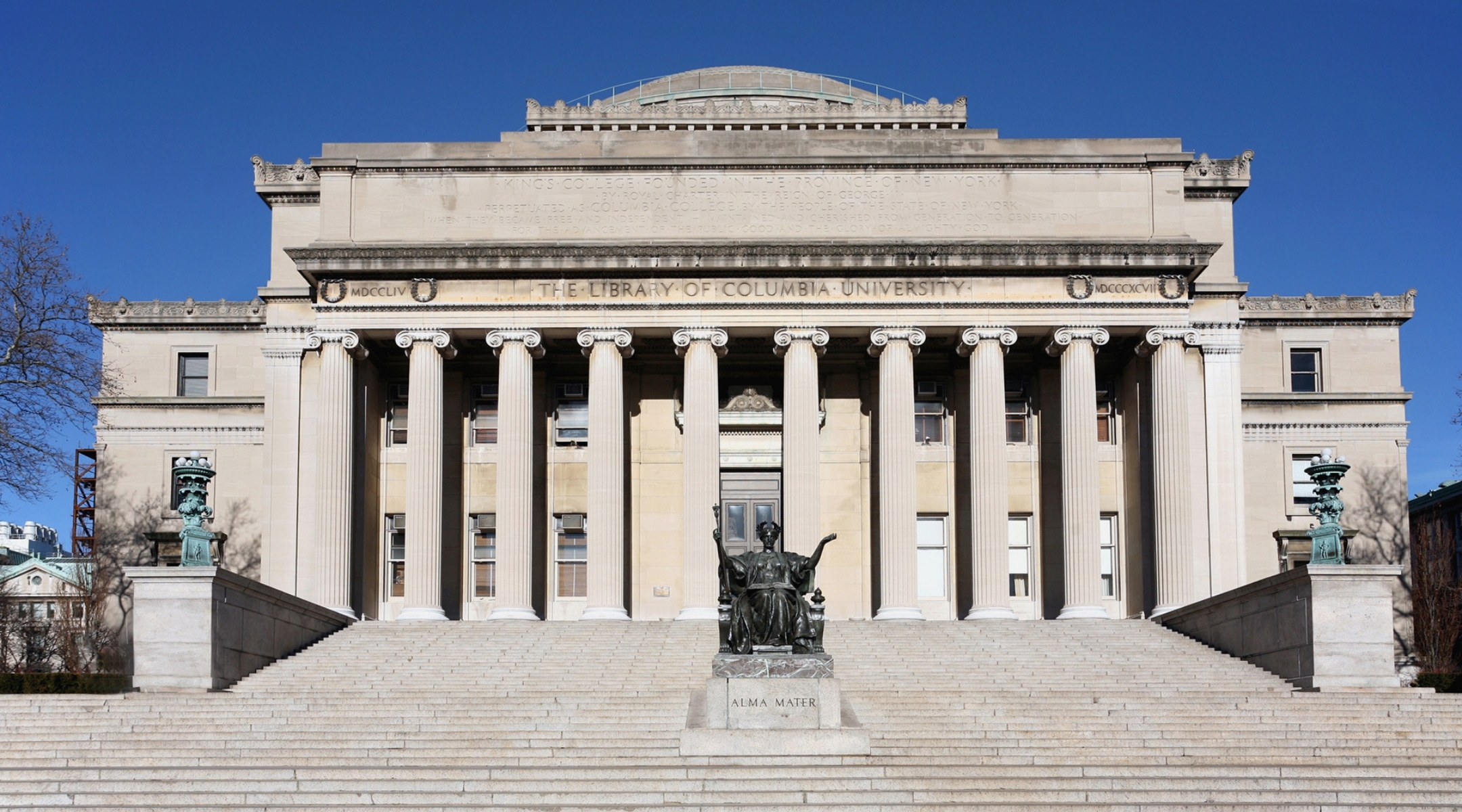Amid criticism, Columbia University announces a new research center in Tel Aviv
The Tel Aviv Global Center will focus on climate change, technology, entrepreneurship, arts, the humanities, biology, health and medicine

Columbia University is set to launch a Global Center in Tel Aviv despite faculty opposition. (Columbia University)
(JTA) — Columbia University has announced that it will launch a “Global Center” in Tel Aviv amid dueling letters from faculty supporting and opposing the decision.
The university’s Global Centers act as hubs for local scholars and researchers to work with the New York City school’s faculty, students and alumni to study and address a range of local and global issues. The center in Tel Aviv will join 10 others across the globe.
The Tel Aviv Global Center will enable the university “to connect with individuals and institutions, as well as with the alumni community in Israel, drawing them closer to the ongoing life of the University,” Columbia President Lee C. Bollinger said in a statement Monday. He added that the center will focus on climate change, technology, entrepreneurship, arts, the humanities, biology, health and medicine.
Columbia already has ties to Tel Aviv through Tel Aviv University, with which it began a dual degree program in 2019, despite also facing faculty and student objections.
For decades, Columbia has been the site of heated debate among both faculty and students over the Israeli-Palestinian conflict, and in the months leading up to the announcement, a group of Columbia faculty urged the school to halt plans for a center in Tel Aviv. In February, law professor Katherine Franke began circulating an open letter against the center, which as of Tuesday morning had received 95 faculty signatures, according to the Columbia Daily Spectator, a student publication.
The letter references accusations of Israeli human rights violations, as well as the policies of Israel’s governing coalition, which includes far-right parties and which has put forward a proposal for a judicial overhaul that has led to massive street protests and upheaval in the country.
“We are particularly concerned that Columbia University would take the bold step of opening a Global Center in Tel Aviv at this particular moment, with the newly seated government that is widely, if not almost universally, regarded as the most conservative, reactionary, right wing government in Israel’s history,” the letter reads. “For Columbia to preemptively invest in a new Global Center in Israel at the very moment when the domestic and international community is pulling away as part of a concerted and vehement objection to the new government’s policies would render Columbia not only an outlier, but a collaborator in those very policies.”
While the letter notes broadly that Global Centers have served as a “liberal academic footprint” in other countries with restrictive regimes, it does not reference the individual human rights records of any of the other countries where the centers are located. The 10 existing centers are in Amman, Jordan; Athens, Greece; Beijing; Istanbul; Mumbai, India; Nairobi, Kenya; Paris; Rio de Janeiro; Santiago, Chile and Tunis, Tunisia.
The letter also argues that Israel would ban Columbia alumni and affiliates based on their citizenship, identity and politics.
Franke herself was barred from Israel in 2018, along with attorney Vincent Warren of the Center for Constitutional Rights, based on accusations that they supported the Boycott, Divestment and Sanctions movement, or BDS, against Israel. Both denied the accusations at the time, according to Haaretz. Around that same time, according to an opinion column by Roger Cohen in The New York Times, Bollinger was in Israel to discuss plans for the Global Center.
The letter also notes “substantial concern about the power of donor money to direct major decisions, such as the establishment of this Global Center in Tel Aviv, in lieu of consultation with the faculty.” The letter does not name any specific donors or detail how the alleged donor pressure was deployed.
In response to the opposition letter, faculty supporters of the Tel Aviv Global Center composed their own statement. They argue that the centers are independent of their governments’ host countries and do not signal approval or disapproval of each country’s government.
“The decision to locate a center in all of these countries was never determined by political considerations, but rather to enhance Columbia as a global research university,” the statement reads. “For a country its size, Israel has an unusually rich infrastructure of universities and other scholarly, cultural, religious, scientific, technological, legal, and artistic resources that have intellectual connections to every school at Columbia University.”
The statement of support, signed by more than 170 full-time faculty, was written by political science professor Ester R. Fuchs; Nicholas Lemann, dean emeritus of the Columbia Journalism School; David M. Schizer, dean emeritus and professor at the Columbia Law School and law professor Matthew C. Waxman.
The supportive letter says that Israel has a better human rights record than other countries that host the university’s centers — such as China or Jordan — and adds that many signatories do not approve of Israel’s current government.
“One does not have to support the policies of the current government of Israel — and many of us do not — to recognize that singling out Israel in this way is unjustified,” the letter says. “To apply a separate standard to Israel — and Israel alone — would understandably be perceived by many as a form of discrimination.”
This article originally appeared on JTA.org.















